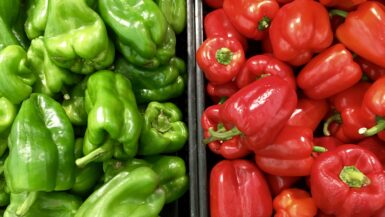As more and more people are becoming health-conscious, the popularity of organic foods is on the rise. Organic foods are grown without the use of synthetic pesticides and fertilizers, and are not genetically modified. They are also free from antibiotics, growth hormones, and other harmful chemicals. Eating organic foods has several benefits for our health, the environment, and the economy. In this article, we will explore the various benefits of eating organic foods and why it is important to make the switch to organic produce.
What are organic foods?
Organic foods are those that are grown or raised without the use of synthetic pesticides, fertilizers, or genetically modified organisms (GMOs). Organic farming practices prioritize the use of natural methods to maintain soil fertility, conserve water, and promote biodiversity. Livestock raised for organic meat, dairy, and eggs are not given antibiotics or growth hormones and are allowed access to the outdoors.
The term “organic” is regulated by the United States Department of Agriculture (USDA). Foods that are labeled “organic” must meet strict standards and undergo certification by a USDA-accredited certifying agent. This ensures that consumers can trust that the food they are buying is truly organic.
Organic foods are becoming increasingly popular as people become more health-conscious and concerned about the impact of conventional farming practices on the environment and animal welfare. In the following sections, we will explore the benefits of eating organic foods for your health, the environment, animal welfare, and local communities.
The benefits of eating organic foods for your health
Eating organic foods can have many benefits for your health. One of the main advantages is that organic foods are often higher in nutrients than conventionally grown foods. Studies have shown that organic fruits and vegetables contain higher levels of certain vitamins, minerals, and antioxidants than their non-organic counterparts.
Organic foods are also free from synthetic pesticides and fertilizers, which have been linked to a range of health problems including cancer, hormone disruption, and neurological disorders. By choosing organic foods, you can reduce your exposure to these harmful chemicals and protect your health.
Another benefit of organic foods is that they are often free from genetically modified organisms (GMOs). GMOs have been linked to a range of health problems including allergies, digestive issues, and antibiotic resistance. By choosing organic foods, you can avoid these potential health risks.
Organic meat, dairy, and eggs are also healthier options as they come from animals that are raised without antibiotics or growth hormones. These chemicals can accumulate in animal products and may contribute to antibiotic resistance and other health problems in humans.
Overall, eating organic foods can provide many health benefits and help you maintain a healthy lifestyle. In the following sections, we will explore the benefits of organic foods for the environment, animal welfare, and local communities.
The benefits of eating organic foods for the environment
Organic farming practices prioritize the use of natural methods to maintain soil fertility, conserve water, and promote biodiversity. By choosing organic foods, you can help support these sustainable farming practices and reduce the environmental impact of agriculture.
One of the main benefits of organic farming is that it does not rely on synthetic pesticides and fertilizers. These chemicals can leach into the soil and water, contaminating the environment and harming wildlife. Organic farmers use natural methods such as crop rotation, cover cropping, and composting to maintain soil fertility and control pests.
Organic farming also promotes biodiversity by creating habitats for beneficial insects, birds, and other wildlife. By avoiding the use of pesticides and other harmful chemicals, organic farms provide a safe environment for these important species to thrive.
Organic farming also helps conserve water by using practices such as drip irrigation and water-efficient crop varieties. This is especially important in areas where water resources are scarce or threatened by climate change.
By choosing organic foods, you can help support these sustainable farming practices and reduce the environmental impact of agriculture. In the following sections, we will explore the benefits of organic foods for animal welfare, local farmers and communities, and how to incorporate more organic foods into your diet.
The benefits of eating organic foods for animal welfare
Organic farming practices also prioritize the well-being of animals. Livestock raised for organic meat, dairy, and eggs are not given antibiotics or growth hormones, and are allowed access to the outdoors. They are also fed organic feed that is free from synthetic pesticides and fertilizers.
Organic farming provides a more natural and humane environment for animals to live in. They are not confined to small spaces and can engage in natural behaviors such as grazing and foraging. This helps reduce stress and promotes overall animal health.
By choosing organic meat, dairy, and eggs, you can ensure that the animals were raised in a humane and ethical manner. This is not only better for the animals but also for your health, as meat from animals raised in stressful and unsanitary conditions can contain harmful bacteria and antibiotics.
Overall, choosing organic foods can help support more ethical and humane treatment of animals. In the following sections, we will explore the benefits of organic foods for local farmers and communities, how to incorporate more organic foods into your diet, and the potential drawbacks and costs of eating organic.
The benefits of eating organic foods for local farmers and communities
Choosing organic foods can also have positive impacts on local farmers and communities. Organic farming supports small-scale and local farmers who often face challenges competing with larger industrial farms. By choosing organic foods, you can help support these farmers and promote local food systems.
Organic farming also creates jobs in rural areas and contributes to local economies. This is because organic farming often requires more labor-intensive practices such as hand weeding and crop rotation, which can create employment opportunities.
Furthermore, organic farming helps preserve farmland and supports sustainable land use practices. By avoiding the use of synthetic pesticides and fertilizers, organic farming helps maintain soil health and fertility. This ensures that farmland remains productive for future generations.
By choosing organic foods, you can help support local farmers and communities, promote sustainable land use practices, and contribute to local economies. In the following sections, we will explore how to incorporate more organic foods into your diet, the potential drawbacks and costs of eating organic, and the future of organic farming and its impact on the food industry.
How to incorporate more organic foods into your diet
Incorporating more organic foods into your diet can be a great way to support your health, the environment, animal welfare, and local farmers and communities. Here are some tips to help you incorporate more organic foods into your diet:
1. Start small: Begin by replacing one or two conventional foods with organic options. For example, switch to organic milk or eggs.
2. Buy in-season produce: In-season produce is often less expensive and more readily available than out-of-season produce. Look for local farmers’ markets or community-supported agriculture (CSA) programs to find fresh, organic produce.
3. Look for sales and discounts: Many grocery stores offer sales and discounts on organic foods. Look for coupons and specials to save money on your organic purchases.
4. Prioritize certain foods: Some foods are more important to buy organic than others. Prioritize buying organic for the “dirty dozen,” which are the 12 fruits and vegetables that are most likely to contain pesticides. These include strawberries, spinach, kale, and apples.
5. Grow your own: Consider starting a small garden to grow your own organic produce. This can be a fun and rewarding way to incorporate more organic foods into your diet.
By incorporating more organic foods into your diet, you can reap the many benefits of organic farming and support sustainable and ethical food systems. In the following sections, we will explore the potential drawbacks and costs of eating organic, as well as how to save money while buying organic.
The potential drawbacks of eating organic foods
While there are many benefits to eating organic foods, there are also some potential drawbacks to consider. These include:
1. Cost: Organic foods are often more expensive than conventionally grown foods. This can make it difficult for some people to afford organic options.
2. Availability: Organic foods may not be as readily available as conventional foods, especially in certain areas or during certain seasons.
3. Shelf life: Organic foods may have a shorter shelf life than conventionally grown foods. This is because they do not contain preservatives or other chemicals that can extend the shelf life of non-organic foods.
4. Nutrient variability: While organic foods are often higher in nutrients than conventionally grown foods, there can be variability in nutrient content depending on the specific growing conditions.
5. Mislabeling: There have been instances of mislabeling of organic foods, which can lead to consumers paying more for products that are not actually organic.
It is important to weigh these potential drawbacks against the many benefits of eating organic foods. By being informed and making informed choices, you can help support sustainable and ethical food systems and promote a healthy lifestyle. In the following sections, we will explore the cost of eating organic foods and how to save money while buying organic, as well as the future of organic farming and its impact on the food industry.
The cost of eating organic foods and how to save money
Eating organic foods can be more expensive than conventionally grown foods, but the benefits to both your health and the environment are worth the extra cost. Organic foods are grown without the use of synthetic pesticides and fertilizers, which can be harmful to both the environment and your health. Organic farming also focuses on improving soil health and biodiversity, which can lead to increased crop yields and more nutritious foods.
However, the higher cost of organic foods can be a barrier for many people. Here are some tips for incorporating more organic foods into your diet without breaking the bank:
Shop in-season
Fruits and vegetables that are in season are often less expensive than those that are out of season. This is because they are readily available and don’t have to be shipped from far away. Shopping at your local farmers market is a great way to find in-season produce at a reasonable cost.
Buy in bulk
Buying in bulk can be a great way to save money on organic foods. Many health food stores and co-ops offer bulk bins where you can buy grains, beans, nuts, and other staples at a lower cost than packaged varieties.
Grow your own
One of the best ways to save money on organic foods is to grow your own. Even if you don’t have a lot of space, you can grow herbs, tomatoes, and other vegetables in containers on a balcony or patio.
Shop around
Not all organic foods are created equal. Prices can vary widely depending on where you shop. Compare prices at different stores and look for sales and coupons to save even more.
By incorporating these tips into your shopping routine, you can enjoy the benefits of organic foods without breaking the bank.
The future of organic farming and its impact on the food industry
The demand for organic foods has been steadily increasing in recent years, with more and more consumers choosing to buy organic products. As a result, the organic food industry has been growing rapidly, and this trend is expected to continue in the future.
Increased availability
As the demand for organic foods grows, more farmers are transitioning to organic farming methods. This means that there will be an increased availability of organic foods in the market, making it easier for consumers to find and purchase these products.
Improved sustainability
Organic farming methods focus on sustainability and environmental stewardship. As more farmers transition to organic farming, there will be a positive impact on the environment, as fewer synthetic pesticides and fertilizers are used. This can also lead to improved soil health, increased biodiversity, and reduced water pollution.
Greater transparency
The growth of the organic food industry has led to greater transparency in the food supply chain. Consumers are increasingly interested in knowing where their food comes from and how it was produced. Organic certification requires farmers to meet strict standards, and this certification process provides consumers with assurance that the food they are buying is produced using sustainable and environmentally friendly methods.
Challenges ahead
While the future of organic farming looks bright, there are still challenges that need to be addressed. One of the biggest challenges is the high cost of organic foods, which can be a barrier for many consumers. Additionally, there is a need for more research on the long-term impact of organic farming methods on soil health, biodiversity, and crop yields.
Overall, the future of organic farming looks promising, with increased availability, improved sustainability, and greater transparency in the food supply chain. As consumers become more aware of the benefits of organic foods, it is likely that the demand for these products will continue to grow, driving further innovation and growth in the organic food industry.





Leave a reply